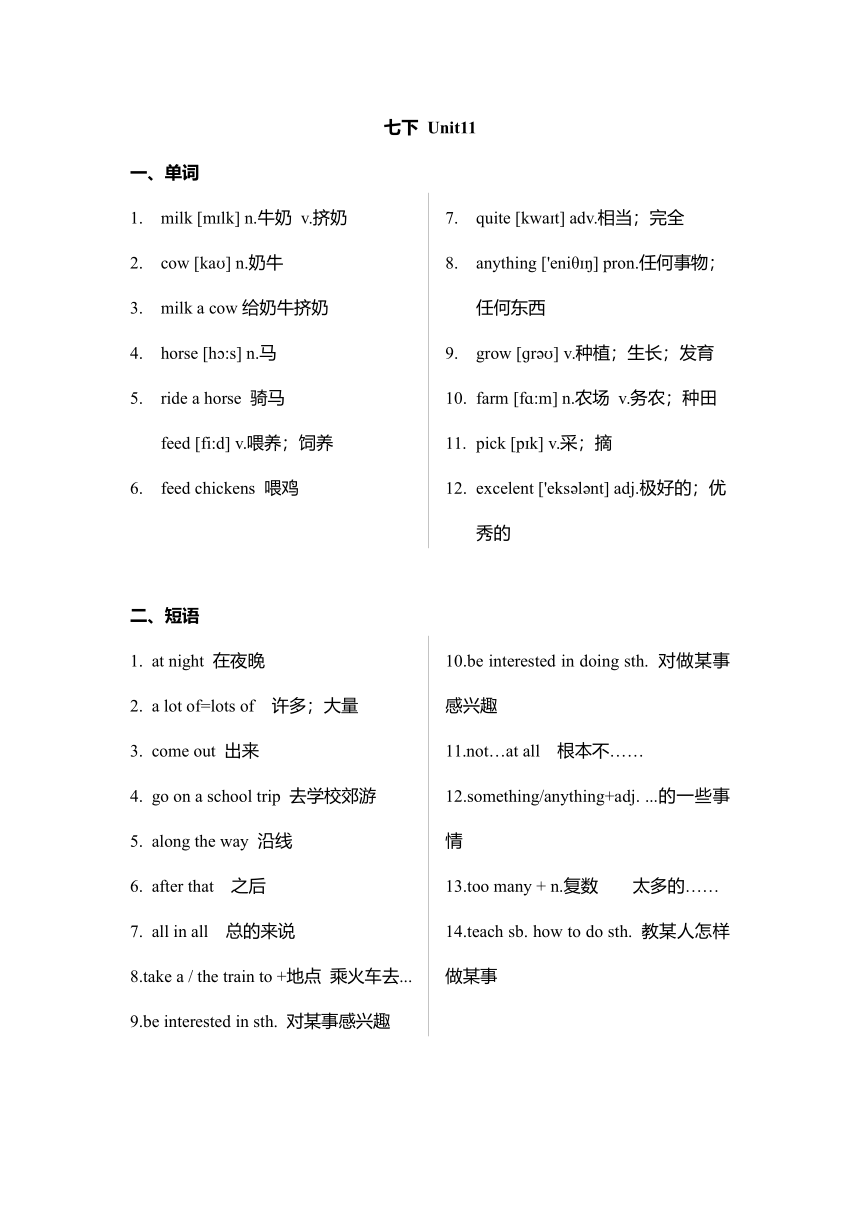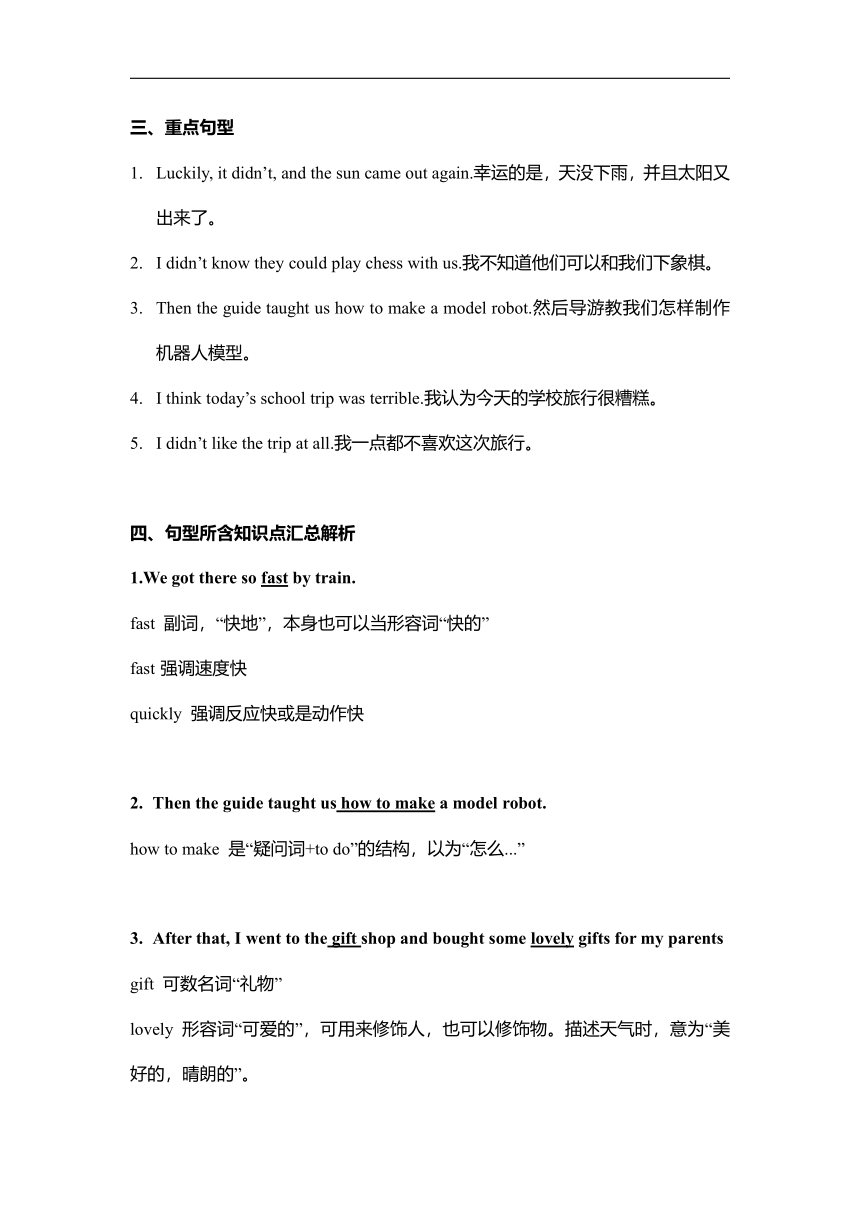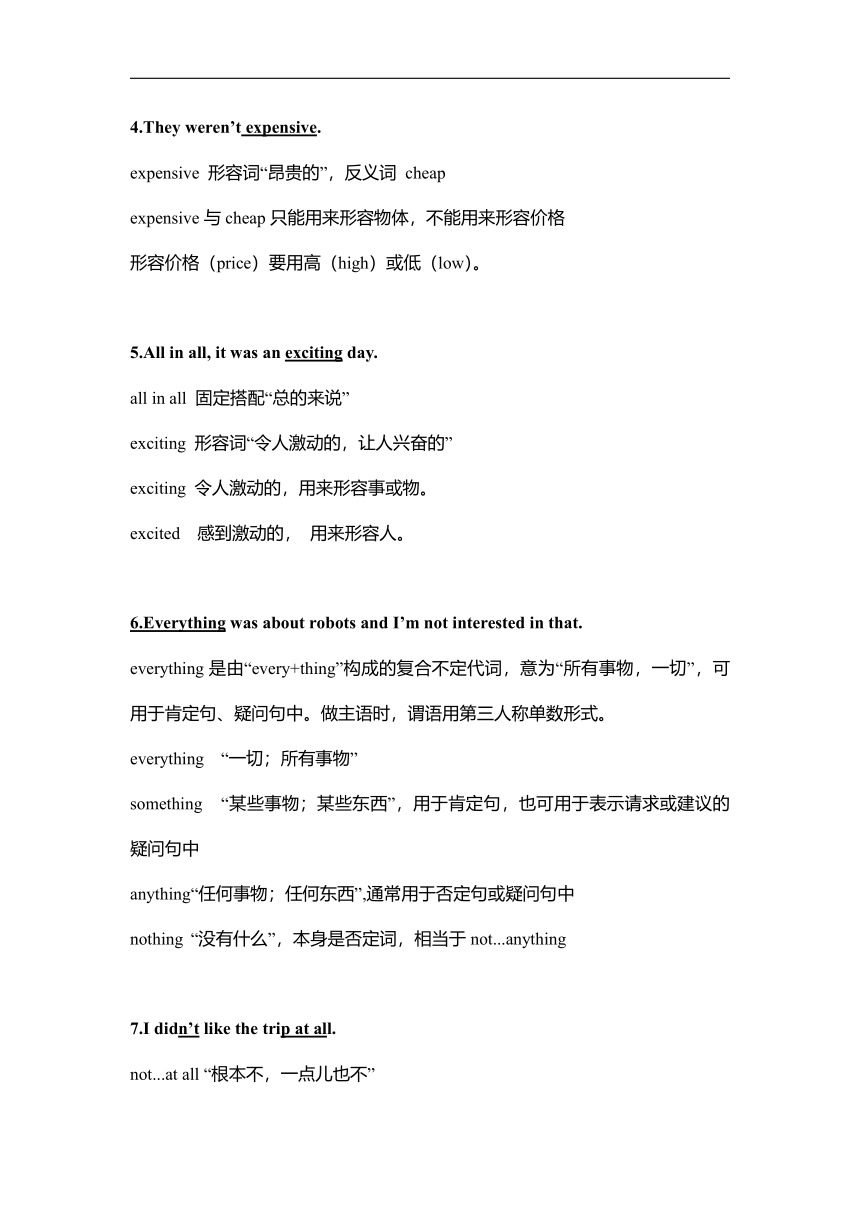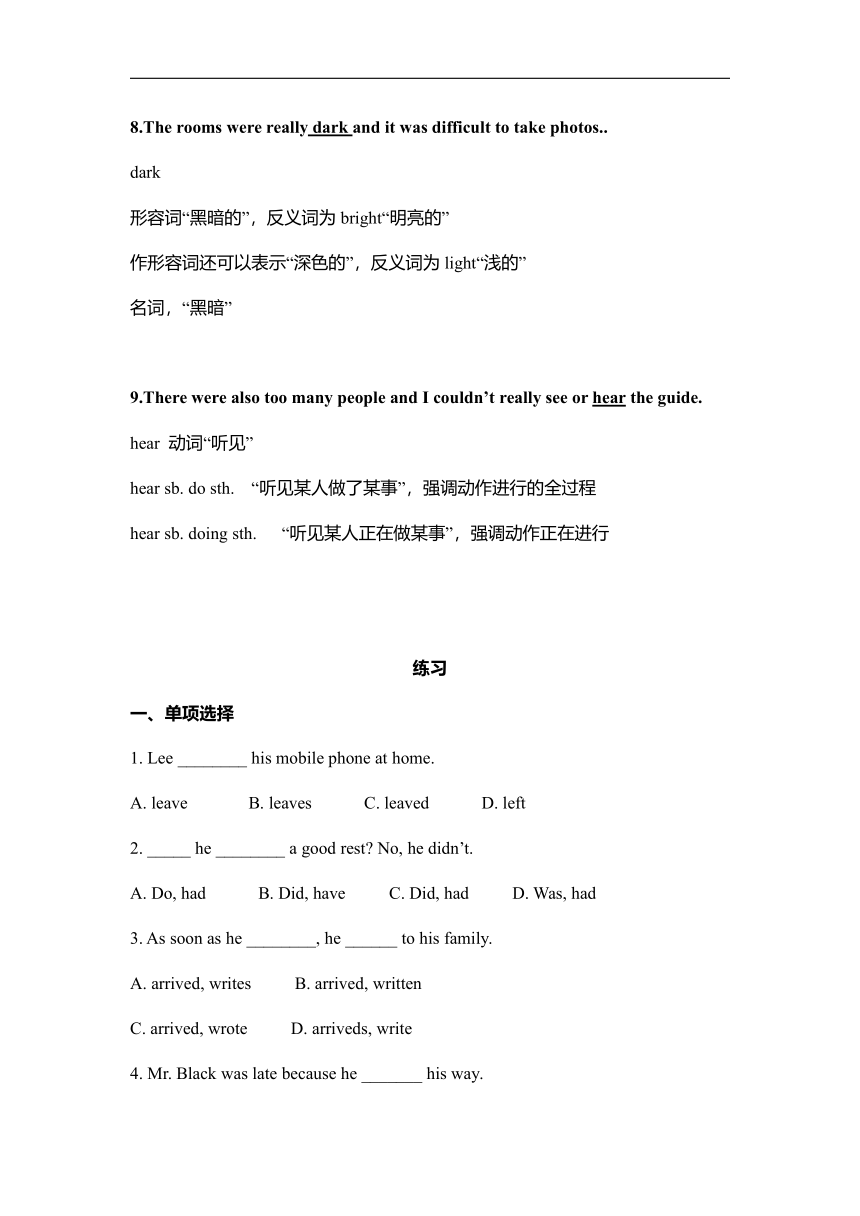人教新目标(Go for it)版七年级下册Unit 11 How was your school trip? 句型所含知识点汇总解析及练习(无答案)
文档属性
| 名称 | 人教新目标(Go for it)版七年级下册Unit 11 How was your school trip? 句型所含知识点汇总解析及练习(无答案) |

|
|
| 格式 | docx | ||
| 文件大小 | 27.2KB | ||
| 资源类型 | 教案 | ||
| 版本资源 | 人教新目标(Go for it)版 | ||
| 科目 | 英语 | ||
| 更新时间 | 2024-06-14 15:53:51 | ||
图片预览




文档简介
七下 Unit11
单词
milk [m lk] n.牛奶 v.挤奶
cow [ka ] n.奶牛
milk a cow给奶牛挤奶
horse [h :s] n.马
ride a horse 骑马
feed [fi:d] v.喂养;饲养
feed chickens 喂鸡
quite [kwa t] adv.相当;完全
anything ['eniθ ] pron.任何事物;任何东西
grow [ɡr ] v.种植;生长;发育
farm [fɑ:m] n.农场 v.务农;种田
pick [p k] v.采;摘
excelent ['eks l nt] adj.极好的;优秀的
二、短语
at night 在夜晚
a lot of=lots of 许多;大量
come out 出来
go on a school trip 去学校郊游
along the way 沿线
after that 之后
all in all 总的来说
8.take a / the train to +地点 乘火车去...
9.be interested in sth. 对某事感兴趣
10.be interested in doing sth. 对做某事感兴趣
11.not…at all 根本不……
12.something/anything+adj. ...的一些事情
13.too many + n.复数 太多的……
14.teach sb. how to do sth. 教某人怎样做某事
三、重点句型
Luckily, it didn’t, and the sun came out again.幸运的是,天没下雨,并且太阳又出来了。
I didn’t know they could play chess with us.我不知道他们可以和我们下象棋。
Then the guide taught us how to make a model robot.然后导游教我们怎样制作机器人模型。
I think today’s school trip was terrible.我认为今天的学校旅行很糟糕。
I didn’t like the trip at all.我一点都不喜欢这次旅行。
句型所含知识点汇总解析
1.We got there so fast by train.
fast 副词,“快地”,本身也可以当形容词“快的”
fast 强调速度快
quickly 强调反应快或是动作快
Then the guide taught us how to make a model robot.
how to make 是“疑问词+to do”的结构,以为“怎么...”
After that, I went to the gift shop and bought some lovely gifts for my parents
gift 可数名词“礼物”
lovely 形容词“可爱的”,可用来修饰人,也可以修饰物。描述天气时,意为“美好的,晴朗的”。
4.They weren’t expensive.
expensive 形容词“昂贵的”,反义词 cheap
expensive与cheap只能用来形容物体,不能用来形容价格
形容价格(price)要用高(high)或低(low)。
5.All in all, it was an exciting day.
all in all 固定搭配“总的来说”
exciting 形容词“令人激动的,让人兴奋的”
exciting 令人激动的,用来形容事或物。
excited 感到激动的, 用来形容人。
6.Everything was about robots and I’m not interested in that.
everything是由“every+thing”构成的复合不定代词,意为“所有事物,一切”,可用于肯定句、疑问句中。做主语时,谓语用第三人称单数形式。
everything “一切;所有事物”
something “某些事物;某些东西”,用于肯定句,也可用于表示请求或建议的疑问句中
anything “任何事物;任何东西”,通常用于否定句或疑问句中
nothing “没有什么”,本身是否定词,相当于not...anything
7.I didn’t like the trip at all.
not...at all “根本不,一点儿也不”
8.The rooms were really dark and it was difficult to take photos..
dark
形容词“黑暗的”,反义词为bright“明亮的”
作形容词还可以表示“深色的”,反义词为light“浅的”
名词,“黑暗”
9.There were also too many people and I couldn’t really see or hear the guide.
hear 动词“听见”
hear sb. do sth. “听见某人做了某事”,强调动作进行的全过程
hear sb. doing sth. “听见某人正在做某事”,强调动作正在进行
练习
单项选择
1. Lee ________ his mobile phone at home.
A. leave B. leaves C. leaved D. left
2. _____ he ________ a good rest No, he didn’t.
A. Do, had B. Did, have C. Did, had D. Was, had
3. As soon as he ________, he ______ to his family.
A. arrived, writes B. arrived, written
C. arrived, wrote D. arriveds, write
4. Mr. Black was late because he _______ his way.
A. losted B. lose C. loses D. lost
5. When _________ Lee ________ school this morning
A. did, got to B. did, get to C. did, get D. did, got
6. Last Sunday we watched _______ at the zoo.
A. an elephant show B. elephant show C. elephant’s show D. an elephant’s show
7. Finally, tired _______ happy, we took the subway back home.
A. and B. but C. or D. more
8. Every year we go to the beach _______we can pick up lots of shells.
A. when B. on it C. where D. in the place
9. We _______ the train to the museum yesterday.
A. on B. by C. took D. take
10. — How was your weekend with your grandpa, Tom
— _______
A. It was great. B. Sounds good.
C. We played chess. D. We walked there.
二、阅读
In Germany there are different kinds of schools. All schools are great places for making friends and learning things.
Short days
Most high schools in Germany begin at about 8:00 am and they will finish at 3:30 pm. That is to say your morning will be busy with classes. You will have time to do homework and go to some private (私人的) clubs after school.
Getting to school
Most students take public transport (公共交通工具) to school or ride a bike. There are some school buses, too. Parents don’t drive their children to school.
Clubs
Schools in Germany don’t have sports clubs or other clubs. After school the students go to some clubs outside school. There are clubs for things like soccer, dance, singing and so on.
Different states (州), different schools
Each German state has its different schools. The school in Branden-burg will be different from the system (体系) in Bavaria. Where you live and your knowledge (知识) will decide (决定) what school you can go.
1.It’s 10 am on Monday, the students in Germany are ________.
A.at school B.in the club C.at home D.on the bus
2.The students in Germany don’t ________ to school.
A.take the train B.ride their bikes C.take school buses D.take their parents’ cars
3.Which of the following is NOT TRUE
A.Each of German state has its different schools.
B.The schools in Germany don’t have any clubs.
C.Students are busy all the afternoon at school.
D.Some students usually go to school by school bus in Germany.
三、用所给词的适当形式填空
1. --_____________she _____________(play) her guitar(吉他) yesterday
--No, she _____________.
2.—What ___________Tom __________ (do) on Saturday evening
--He _________(watch) TV and __________(read) an interesting book.
3.She _____________(not visit) her aunt last weekend. She ____________(stay) at home and ___________(do) some cleaning.
4.–How _______________(be) Jim’s weekend
--It _________________(be not ) bad.
5. He often ______(play) basketball after school when he was a student.
6. They___________ (play) chess in the classroom last PE lesson.
7. My mother ___________(cook) a nice food last Spring Festival.
8. The girls___________ (dance) at the party last night.
9. I____________ (watch) a movie on Saturday last week.
10. ________ you ___________ (visit) your relatives last Spring Festival
四、根据汉语意思完成英语句子。
1.你对画画感兴趣吗
Are you ________ ________ painting
2.这些农民去年种了草莓。
The farmers ________ ________ last year.
3.总的来说, 这次旅行非常好。
________ ________ ________, the trip was great.
4.你爬过山吗 不, 我没有。
— ________ you ________ a ________
— ________, I ________.
5.不要担心, 他会喂鸡的。
________ ________ . He can ________ ________ ________.
6. 对于大多数孩子来说,周末是有趣的。
_______ _______ ________, the weekend was fun.
7. 去年,他通常呆在家里看电视。
Last year, he usually _______ _______ _______and _______ _______.
8. 去年我常和爸爸一起去钓鱼。
I often _______ ________ with my father last year.
9. 他们去海边玩的很开心。
They went to the beach and _______ _______ great _______ there.
10. 对我们来说学好英语是很重要的。
It’s _______ ________ us to _______English ______.
五、句型转换
1.I played the guitar over the weekend.(对画线提问)
What ___________ you ___________ over the weekend
2.Every week he goes to the library.(用last week 改写)
__________ week he ___________ to the library.
3.Jim’s weekend was very great.(对环线提问)
__________ __________ Jim’s weekend
4.I had a busy holiday. (变否定句)
I ________ __________ a busy holiday.
5.Tina saw an interesting talk show last night.(变一般疑问句)
__________ Tina__________ an interesting talk show last night
单词
milk [m lk] n.牛奶 v.挤奶
cow [ka ] n.奶牛
milk a cow给奶牛挤奶
horse [h :s] n.马
ride a horse 骑马
feed [fi:d] v.喂养;饲养
feed chickens 喂鸡
quite [kwa t] adv.相当;完全
anything ['eniθ ] pron.任何事物;任何东西
grow [ɡr ] v.种植;生长;发育
farm [fɑ:m] n.农场 v.务农;种田
pick [p k] v.采;摘
excelent ['eks l nt] adj.极好的;优秀的
二、短语
at night 在夜晚
a lot of=lots of 许多;大量
come out 出来
go on a school trip 去学校郊游
along the way 沿线
after that 之后
all in all 总的来说
8.take a / the train to +地点 乘火车去...
9.be interested in sth. 对某事感兴趣
10.be interested in doing sth. 对做某事感兴趣
11.not…at all 根本不……
12.something/anything+adj. ...的一些事情
13.too many + n.复数 太多的……
14.teach sb. how to do sth. 教某人怎样做某事
三、重点句型
Luckily, it didn’t, and the sun came out again.幸运的是,天没下雨,并且太阳又出来了。
I didn’t know they could play chess with us.我不知道他们可以和我们下象棋。
Then the guide taught us how to make a model robot.然后导游教我们怎样制作机器人模型。
I think today’s school trip was terrible.我认为今天的学校旅行很糟糕。
I didn’t like the trip at all.我一点都不喜欢这次旅行。
句型所含知识点汇总解析
1.We got there so fast by train.
fast 副词,“快地”,本身也可以当形容词“快的”
fast 强调速度快
quickly 强调反应快或是动作快
Then the guide taught us how to make a model robot.
how to make 是“疑问词+to do”的结构,以为“怎么...”
After that, I went to the gift shop and bought some lovely gifts for my parents
gift 可数名词“礼物”
lovely 形容词“可爱的”,可用来修饰人,也可以修饰物。描述天气时,意为“美好的,晴朗的”。
4.They weren’t expensive.
expensive 形容词“昂贵的”,反义词 cheap
expensive与cheap只能用来形容物体,不能用来形容价格
形容价格(price)要用高(high)或低(low)。
5.All in all, it was an exciting day.
all in all 固定搭配“总的来说”
exciting 形容词“令人激动的,让人兴奋的”
exciting 令人激动的,用来形容事或物。
excited 感到激动的, 用来形容人。
6.Everything was about robots and I’m not interested in that.
everything是由“every+thing”构成的复合不定代词,意为“所有事物,一切”,可用于肯定句、疑问句中。做主语时,谓语用第三人称单数形式。
everything “一切;所有事物”
something “某些事物;某些东西”,用于肯定句,也可用于表示请求或建议的疑问句中
anything “任何事物;任何东西”,通常用于否定句或疑问句中
nothing “没有什么”,本身是否定词,相当于not...anything
7.I didn’t like the trip at all.
not...at all “根本不,一点儿也不”
8.The rooms were really dark and it was difficult to take photos..
dark
形容词“黑暗的”,反义词为bright“明亮的”
作形容词还可以表示“深色的”,反义词为light“浅的”
名词,“黑暗”
9.There were also too many people and I couldn’t really see or hear the guide.
hear 动词“听见”
hear sb. do sth. “听见某人做了某事”,强调动作进行的全过程
hear sb. doing sth. “听见某人正在做某事”,强调动作正在进行
练习
单项选择
1. Lee ________ his mobile phone at home.
A. leave B. leaves C. leaved D. left
2. _____ he ________ a good rest No, he didn’t.
A. Do, had B. Did, have C. Did, had D. Was, had
3. As soon as he ________, he ______ to his family.
A. arrived, writes B. arrived, written
C. arrived, wrote D. arriveds, write
4. Mr. Black was late because he _______ his way.
A. losted B. lose C. loses D. lost
5. When _________ Lee ________ school this morning
A. did, got to B. did, get to C. did, get D. did, got
6. Last Sunday we watched _______ at the zoo.
A. an elephant show B. elephant show C. elephant’s show D. an elephant’s show
7. Finally, tired _______ happy, we took the subway back home.
A. and B. but C. or D. more
8. Every year we go to the beach _______we can pick up lots of shells.
A. when B. on it C. where D. in the place
9. We _______ the train to the museum yesterday.
A. on B. by C. took D. take
10. — How was your weekend with your grandpa, Tom
— _______
A. It was great. B. Sounds good.
C. We played chess. D. We walked there.
二、阅读
In Germany there are different kinds of schools. All schools are great places for making friends and learning things.
Short days
Most high schools in Germany begin at about 8:00 am and they will finish at 3:30 pm. That is to say your morning will be busy with classes. You will have time to do homework and go to some private (私人的) clubs after school.
Getting to school
Most students take public transport (公共交通工具) to school or ride a bike. There are some school buses, too. Parents don’t drive their children to school.
Clubs
Schools in Germany don’t have sports clubs or other clubs. After school the students go to some clubs outside school. There are clubs for things like soccer, dance, singing and so on.
Different states (州), different schools
Each German state has its different schools. The school in Branden-burg will be different from the system (体系) in Bavaria. Where you live and your knowledge (知识) will decide (决定) what school you can go.
1.It’s 10 am on Monday, the students in Germany are ________.
A.at school B.in the club C.at home D.on the bus
2.The students in Germany don’t ________ to school.
A.take the train B.ride their bikes C.take school buses D.take their parents’ cars
3.Which of the following is NOT TRUE
A.Each of German state has its different schools.
B.The schools in Germany don’t have any clubs.
C.Students are busy all the afternoon at school.
D.Some students usually go to school by school bus in Germany.
三、用所给词的适当形式填空
1. --_____________she _____________(play) her guitar(吉他) yesterday
--No, she _____________.
2.—What ___________Tom __________ (do) on Saturday evening
--He _________(watch) TV and __________(read) an interesting book.
3.She _____________(not visit) her aunt last weekend. She ____________(stay) at home and ___________(do) some cleaning.
4.–How _______________(be) Jim’s weekend
--It _________________(be not ) bad.
5. He often ______(play) basketball after school when he was a student.
6. They___________ (play) chess in the classroom last PE lesson.
7. My mother ___________(cook) a nice food last Spring Festival.
8. The girls___________ (dance) at the party last night.
9. I____________ (watch) a movie on Saturday last week.
10. ________ you ___________ (visit) your relatives last Spring Festival
四、根据汉语意思完成英语句子。
1.你对画画感兴趣吗
Are you ________ ________ painting
2.这些农民去年种了草莓。
The farmers ________ ________ last year.
3.总的来说, 这次旅行非常好。
________ ________ ________, the trip was great.
4.你爬过山吗 不, 我没有。
— ________ you ________ a ________
— ________, I ________.
5.不要担心, 他会喂鸡的。
________ ________ . He can ________ ________ ________.
6. 对于大多数孩子来说,周末是有趣的。
_______ _______ ________, the weekend was fun.
7. 去年,他通常呆在家里看电视。
Last year, he usually _______ _______ _______and _______ _______.
8. 去年我常和爸爸一起去钓鱼。
I often _______ ________ with my father last year.
9. 他们去海边玩的很开心。
They went to the beach and _______ _______ great _______ there.
10. 对我们来说学好英语是很重要的。
It’s _______ ________ us to _______English ______.
五、句型转换
1.I played the guitar over the weekend.(对画线提问)
What ___________ you ___________ over the weekend
2.Every week he goes to the library.(用last week 改写)
__________ week he ___________ to the library.
3.Jim’s weekend was very great.(对环线提问)
__________ __________ Jim’s weekend
4.I had a busy holiday. (变否定句)
I ________ __________ a busy holiday.
5.Tina saw an interesting talk show last night.(变一般疑问句)
__________ Tina__________ an interesting talk show last night
同课章节目录
- Unit 1 Can you play the guitar?
- Section A
- Section B
- Unit 2 What time do you go to school?
- Section A
- Section B
- Unit 3 How do you get to school?
- Section A
- Section B
- Unit 4 Don't eat in class.
- Section A
- Section B
- Unit 5 Why do you like pandas?
- Section A
- Section B
- Unit 6 I'm watching TV.
- Section A
- Section B
- Review of Units 1-6
- Unit 7 It's raining!
- Section A
- Section B
- Unit 8 Is there a post office near here?
- Section A
- Section B
- Unit 9 What does he look like?
- Section A
- Section B
- Unit 10 I'd like some noodles.
- Section A
- Section B
- Unit 11 How was your school trip?
- Section A
- Section B
- Unit 12 What did you do last weekend?
- Section A
- Section B
